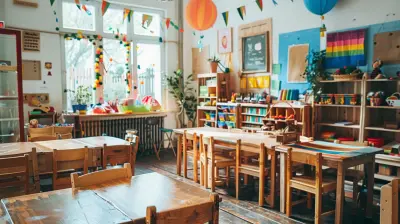Building a Strong Foundation for Lifelong Learning
6 July 2025
Let’s be real—learning doesn't stop when we finish school. In fact, for most of us, that's just the warm-up. The real learning? That happens throughout life. Whether you're picking up a new hobby, switching careers, or simply trying to keep up with this ever-changing world, being a lifelong learner is more important than ever.
But here's the thing: To truly thrive in lifelong learning, you need a strong foundation. Without that base, every new skill or concept you try to absorb feels like building a house on quicksand—unstable and stressful.
So how do you build that foundation? Glad you asked. Let's break it down together.
What Is Lifelong Learning, Really?
Lifelong learning isn’t just a trendy buzzword. It's a mindset—a way of living that values continuous growth and self-improvement. It's not limited to academic stuff, either. Lifelong learning includes everything from learning to cook new dishes, mastering digital tools, or finally understanding how your personal finances work.In simplest terms, lifelong learning means staying curious and hungry for knowledge, no matter your age or stage in life.
Why Is Building a Foundation So Important?
Think of it this way: If learning was a car, your foundation would be the engine. It’s what drives your ability to take on new subjects, stick with challenges, and actually retain what you're learning. Without a solid base, it’s hard to stay motivated or even know where to start.Here's why your foundation matters:
- It boosts your confidence – When you know the basics, you’re not constantly second-guessing yourself.
- It keeps you organized – You’ll be better at picking learning strategies that suit your style.
- It makes learning fun – Yes… fun! When you're not frustrated by every little concept, you can actually enjoy the process.
Pillars of a Strong Learning Foundation
Building a solid base for lifelong learning isn't as complicated as it sounds. Let’s talk about the core pillars—those key ingredients that make your learning journey smoother and more rewarding.1. Cultivating a Growth Mindset
Ever heard of a “growth mindset”? It’s the belief that abilities and intelligence can be developed with effort and practice.People with a growth mindset embrace challenges, persevere through setbacks, and see failure as a stepping stone—not a dead-end.
On the flip side, a fixed mindset locks you in. It whispers, “You’re not good at this,” and convinces you to give up before you really begin.
How to get there:
- Catch yourself when negative self-talk creeps in.
- Replace “I can’t do this” with “I can’t do this yet.”
- Celebrate small wins—they matter more than you think.
2. Developing Critical Thinking Skills
You can memorize facts all day, but if you don’t know how to analyze information or question it, you’re not really learning—you’re just absorbing.Critical thinking helps you distinguish between valuable knowledge and noise (and yeah, there's a lot of noise out there).
Practice by:
- Asking “why” and “how” constantly.
- Looking at issues from multiple angles.
- Engaging in thoughtful conversations with people who see things differently.
3. Building Strong Reading and Comprehension Habits
Reading is fuel for your brain. It opens your mind, exposes you to fresh ideas, and deepens your understanding across all subjects.But it's not just about quantity—quality matters even more. You’ve got to read closely and really grasp what’s being said.
Tips:
- Choose content that challenges your thinking.
- Take notes or summarize what you read.
- Discuss what you’ve learned with others—it helps lock in the knowledge.
4. Setting Clear Goals
Learning without goals is like sailing without a compass—you’ll drift aimlessly. Setting clear, realistic goals gives direction and motivation.And no, your goals don’t have to be earth-shattering. Even a simple goal like “Read one educational article a day” can lead to huge growth over time.
Use the SMART method:
- Specific
- Measurable
- Achievable
- Relevant
- Time-bound
Goal: “Learn basic graphic design by creating one new design a week for three months.” Boom! That’s a solid game plan.
Habits That Strengthen Lifelong Learning Skills
Once you’ve got a foundation, habits are what keep it strong. Let’s look at daily practices that support your learning groove.1. Be Curious—Like, Really Curious
Remember when you were a kid and asked “Why?" a million times? That’s the kind of curiosity you want to get back. It’s the engine of all learning.The more questions you ask, the more answers you seek—and the more you grow.
2. Embrace Mistakes
Mistakes are not your enemy—they're your greatest teachers. Every time you mess up, you’re actually leveling up.Don’t fear them. Study them. What went wrong? What will you do differently next time?
3. Use Tech to Your Advantage
Let’s face it—technology is a game-changer for learning. From educational apps to online courses, there’s a tool for pretty much every topic you can think of.But don’t just scroll aimlessly. Be intentional. Set goals, track your progress, and reflect on what you’re learning.
4. Create a Learning Environment That Works for You
You don’t need a fancy office or a quiet library to learn. You just need a space where your brain feels alert and focused.It could be your kitchen table, a cozy coffee shop, or that quiet corner of the house. Add some snacks and good lighting, and you’re good to go.
Lifelong Learning in Different Life Stages
Lifelong learning looks different at different points in life. Let’s break it down.For Kids and Teens
This is where the foundation is built. Schools play a role, but parents and mentors make a huge difference too. Encouraging curiosity, praising effort, and allowing mistakes create confident learners.For Young Adults
Whether you’re in college or just starting a job, this is the time to solidify learning habits. Explore different fields. Take risks. The focus should be on discovering who you are and what you’re passionate about.For Adults
Maybe you're juggling work, family, and life, but that doesn’t mean you stop learning. In fact, it’s crucial. Staying updated helps your career and boosts your mental sharpness.Podcasts during your commute? Online courses at night? Totally doable.
For Seniors
It’s never too late. Learning keeps the brain active and can prevent cognitive decline. Plus, it’s fun! Dive into literature, learn a new language, or pick up painting.It's not about competition—it's about connection and curiosity.
Overcoming Common Roadblocks
Let’s not sugarcoat it—learning for life comes with some real challenges.“I Don’t Have Time”
We all feel pressed for time. But lifelong learning doesn’t require hours each day. Even 15 focused minutes a day adds up.Tip: Stack learning with other activities. Listen to audiobooks while walking or cleaning.
“I’m Too Old”
That myth needs to go. Your brain has the capacity to grow and change throughout your life. Neuroplasticity is a beautiful thing!Start with something you enjoy and ease into it.
“I’m Not Smart Enough”
This one breaks my heart. Intelligence isn’t fixed—it’s developed. And effort matters way more than “natural talent.”It’s not about being the best; it’s about showing up and learning something new, today.
Practical Ways to Start Strengthening Your Foundation Today
Ready to take the first step? Try some of these:- Join a book club
- Watch TED Talks or educational YouTube channels
- Listen to subject-specific podcasts
- Take a free online course (Coursera, edX, etc.)
- Swap skills with a friend—teach each other something new
- Journal what you learn each day
Start small. Be consistent. And most of all—enjoy the ride.
The Bottom Line
Building a strong foundation for lifelong learning isn’t just about collecting knowledge—it’s about creating a mindset and habits that fuel curiosity and growth for years to come. It's like planting a tree today that will give you shade, fruit, and beauty for the rest of your life.So, wherever you are right now—young, old, working, parenting, retired—it’s the perfect time to start. Lifelong learning is not a race. It’s a journey with no finish line. And trust me—you’re capable of more than you think.
Let’s keep learning, together.
all images in this post were generated using AI tools
Category:
Parent InvolvementAuthor:

Olivia Chapman
Discussion
rate this article
1 comments
Jacob McCullough
Great insights! Lifelong learning truly shapes our future and growth.
July 19, 2025 at 3:55 AM

Olivia Chapman
Thank you! I'm glad you found the insights valuable. Lifelong learning is indeed essential for our growth and future success!


